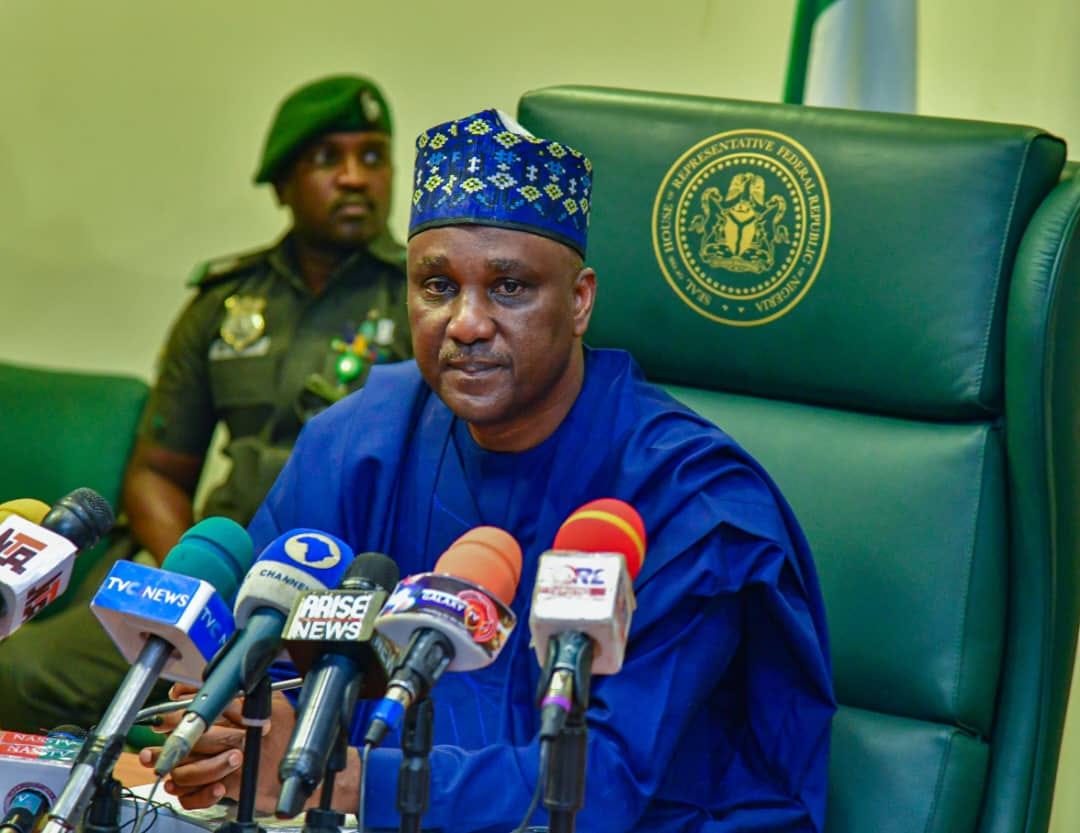919
By Tracy Moses
President Bola Ahmed Tinubu and the Speaker of the House of Representatives, Rt. Hon. Tajudeen Abbas, on Monday underscored the urgent need for a far-reaching legal reform to confront Nigeria’s mounting and dynamic security threats.
They made the call at a one-day legislative dialogue on the review of the country’s security architecture, convened by the House Committee on Constitution Review in collaboration with the Office of the National Security Adviser.
Represented by the Minister of Defence, Mohammed Badaru Abubakar, President Tinubu described the event as a matter of national importance, asserting that the constitutional framework must evolve to reflect contemporary security realities.
“For years, our constitution has been the backbone of our democracy. However, with the rapid evolution of technology, emerging security threats, and changing federal dynamics, certain provisions have become outdated,” Tinubu said.
He emphasized the need to adapt Nigeria’s security strategy to present-day conditions, adding that neither centralized command nor total decentralization is sufficient to secure the country.
“Calls for state police, responses to cyber threats, and the need for robust intelligence coordination have become more pronounced. Today’s security demands partnership, not rivalry,” the President noted.
He cited recent successful joint security operations, such as the disruption of separatist elements in the South East, clearing of criminal enclaves in the North West, and enhanced responses to transnational threats, as evidence of effective collaboration.
These efforts, he said, align with the Renewed Hope Agenda, which aims to restore peace and rebuild public confidence in government protection efforts.
Key components of the agenda include the launch of the National Safe Schools Response Coordination Centre, acquisition of modern surveillance tools and mine-resistant vehicles, and the rollout of a community policing framework designed to close the gap between citizens and law enforcement.
Tinubu also stressed the importance of strengthening border security and adopting cybersecurity measures to guard against both traditional and emerging threats.
“Security discussions must include the challenge posed by our vast and often unguarded borders, which facilitate arms trafficking and cross-border crimes. Our constitution must clearly define the responsibilities of both federal and sub-national actors in securing our territorial integrity,” he stated.
In his address, Speaker Tajudeen Abbas described the dialogue as a crucial milestone in the push to revamp Nigeria’s security laws and institutions.
“The grim realities of terrorism, banditry, piracy, militancy, and crude oil theft have turned daily life into a nightmare for millions. Only adaptive, inclusive, and tech-driven legal reforms can address these issues effectively,” he asserted.
Abbas advocated for a complete review of existing security legislation to eliminate redundancies, update obsolete laws, and introduce new ones that foster cooperation and efficiency. He highlighted House Bill 617, which proposes the creation of state police, a subject that has continued to dominate public discourse.
He also called for prompt legislative support for border control measures, citing the recently passed Control of Small Arms and Light Weapons Act, 2024, as a step in the right direction.
“Security is a shared responsibility, not limited to the police or military. Our legal reforms must reflect the voices and needs of ordinary Nigerians, and today’s dialogue is a step toward achieving that,” Abbas said.
Deputy Speaker Benjamin Kalu, who also chairs the House Committee on Constitution Review, said the goal of the engagement was to receive direct input from frontline security operators on how constitutional gaps hamper their work.
“For too long, we have legislated without adequately understanding the operational constraints faced by our security services. This platform enables us to identify and address those bottlenecks,” Kalu stated.
He compared the review process to medical diagnostics, arguing that lawmakers must consult security experts before prescribing legislative remedies.
Chief of Defence Staff, General Christopher Musa, called for an urgent update to the legal provisions governing the Armed Forces, noting that existing frameworks are ill-suited for addressing modern challenges like cyber warfare and hybrid threats.
He highlighted several procedural shortcomings, such as issues with command structures, arrest and detention protocols during internal deployments, and overlapping functions among agencies.
“These legal uncertainties hinder mission success and operational clarity. We must overhaul critical sections of both the Armed Forces Act and the Constitution,” Musa stressed.
He proposed giving constitutional backing to court-martials as courts of superior record, the establishment of field courts in each military division, and legal powers for the military to detain and investigate suspects in internal security situations.
He also recommended empowering the Navy to work more closely with Customs and Immigration on inland waterways to combat piracy and smuggling.
Other suggestions included allowing the Chief of Defence Staff to submit nominees for service chief appointments and granting courts-martial authority to try terrorists and insurgents under martial law for swift adjudication.
National Security Adviser, Mallam Nuhu Ribadu, reiterated that amending the constitution is key to ensuring long-term peace and national unity.
“Our most potent weapon against insecurity isn’t just military might, but an inclusive and forward-thinking constitution. Real security is rooted in justice, trust, and national cohesion,” Ribadu said.
He commended the National Assembly for championing the reform process and urged participants to seize the opportunity to propose amendments that will improve governance, empower institutions, and decentralize service delivery.
“As this dialogue continues, we must be guided by the vision of building a constitution that protects lives, strengthens our federation, and upholds the dignity of every Nigerian,” Ribadu concluded.



